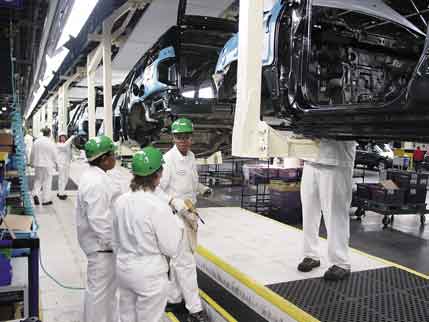Editorial: Bailout Watch 455: The Forgotten Men
In 1979, Chrysler was staring down the barrel of bankruptcy. ChryCo’s charismatic CEO stepped forward, publicly lobbying for $1.5B worth of federal loan guarantees. Lee Iacocca captured the American taxpayer’s respect and trust—to the point where the automaker’s ad folk made Lee the company’s pitchman. “If you can find a better car, buy it!” he dared. They did and they didn’t. Either way, Iacocca’s communication skills were beyond reproach. Contrast that with today’s mumbling, bumbling Motown CEOs, who’ve managed to alienate well over half of the American public, who no longer want to buy Detroit’s cars OR provide them with a second (third) chance. And no wonder. The CEOs have demonstrated an abject inability to call a spade a spade, or sell the spadework that must be done (which is largely grave digging by now). Wagoner, Nardelli and Mulally’s failure is what it is. But what about the little guy in all this? Who speaks for them?
I’m not talking about Detroit’s unionized workers or their white collar counterparts. As much as I sympathize with their plight—caught-up as they are in a poisonous corporate culture not of their own making—they are hardly a downtrodden, voiceless minority. Their Motown overlords have Washington’s ear. The fact that Chrysler and GM have scored over $50 bn in federal handouts of one sort or another (loans, retooling loans, finance company bailouts, etc.), while Ford has arranged a $9 bn line of credit, speaks for itself. Detroit’s dealers, captive finance companies and suppliers are also well represented. But what of everybody else in the American automotive industry?
I refer to the foreign nameplate automakers and their workers. Other than some gentle murmurs of encouragement, we’ve heard nothing from Toyota, Honda, Nissan, Hyundai and the rest of America’s so-called transplants re: Chrysler and GM’s federal trough snuffling. The transplants should be a force to be reckoned with; they currently account for more than half of all automotive sales within our borders. They aren’t technically bankrupt, or facing bankruptcy. Yet their tax money (like ours) must now pay for Detroit’s chronic mismanagement.
The transplants’ productivity and success, their ability to create goods and services that American consumers want at a price that makes the company a profit (in accordance with all U.S. laws and regulations), is now subsidizing Detroit’s ongoing incompetence.
Of course, it’s worse than that. This is not a general taxpayer bitch and moan thing. It’s a government using tax money to distort the will of the American consumer by propping-up a dead competitor trading thing. In a severely contracting market, no less. I know: jobs! jobs! jobs! But what about the jobs! jobs! jobs! of all the productive, hard-working non-Detroit autoworkers laboring within U.S. borders?
The current economic meltdown has forced Toyondaissan to curtail American production, cancel scheduled factory openings and lay off thousands of workers. Would those curtailments have been as severe if Chrysler and GM had been “allowed” to go belly-up? Of course not. Common sense tells us the transplants would have scooped-up a [yet] larger share of the suddenly smaller pie, supporting American jobs and American communities. There’s no getting around it: the federal bailout is taking food of the tables of American workers.
There’s plenty of room to debate the advisability of encouraging foreign nameplates to manufacture cars in the U.S., relative to, say, Detroit-based automakers. (Who’ve shown no reluctance about importing vehicles into the U.S. market.) We’ve engaged in that discussion here on TTAC many times. But where is the voice of the transplants and their workers in this debate?
Again, there are thousands of workers and dozens of communities spread throughout the U.S. who build cars for Toyota, Honda, Nissan and Hyundai. Workers who manufacture a quality product for American consumers. Workers who pay their taxes. Workers who are NOT sucking off the federal teat, either directly or indirectly. Who speaks for them? Are they not outraged by their own government’s willingness to put their jobs at risk to support a business model that’s broken beyond repair?
If they’re not, they should be. Last year, they went to bed and woke-up in a world where free and fair competition, combined with the sweat of their own brow, assured their family’s future. Now, who knows? A cabal of corrupt financiers blew a hole through U.S. banking regulations designed to protect the average wage earner from economic ruin. These insiders opened the door; the feds have come traipsing in, paving Detroit’s road to hell, forcing American autoworkers to compete against their own government.
It’s time for them to tell Washington that these enormous, unrecoverable “loans” to Chrysler and GM are a cancer on their beliefs. I understand the transplants’ desire to keep a low profile and wait for the dust to settle. But America’s traditional values are at stake. Their workers must step up and say no to Bailout Nation.
More by Robert Farago
Latest Car Reviews
Read moreLatest Product Reviews
Read moreRecent Comments
- Steve Biro At a $27K starting point - often with additional dealer discounts - the Equinox was an attractive option for many on a tighter budget. Especially when the FWD model came with a traditional six-speed automatic.Now, with a starting point of just under $30K (and discounts much smaller and/or less likely for a couple of years) and a CVT, the Equinox is suddenly much less competitive.Add to that the need to pay an extra $2K for AWD just to get a real transmission, and the Equinox isn't very competitive at all. An AWD base version will start at about $32K and an RS or Activ will be $36K and change - quite laughable. And one is still stuck with that 1.5-liter turbo powerplant.If this is what Chevy is demanding for the ICE Equinox, it's no wonder a $30K EV version turned out to be vaporware.
- AZFelix I know someone who spent a night in a Dodge Dynasty. The velour interior was the best part of the experience.
- MKizzy Looking at the high-nosed Equinox and its assumed huge front blind spots, I see why Mayor Pete wants to mandate improved AEB on all vehicles.In addition, GM's lack of commitment to its ICE powertrains is on full display with its continued use of its class-trailing 1.xT engines. The new Equinox may be all show/no go, but at least after a decade of shoving its 1.5T into the Equinox and Malibu, you'd think GM would've at least made it top flight reliable by now.
- Daniel China can absolutely make quality products when contracted at the right prices or their car companies trying to compete. However, I doubt any of their nearly 100 EV companies would even want to try to break into the US market with a 25% tariff (Polestar pays this) and the huge service and support network needed other than *maaaaybe* BYD eventually and only then if they end up using their upcoming plant in Mexico for not just Latin America, but decide to try the US market without the tariffs. They def would need to have excellent quality and support to be taken seriously, we'll see!
- VoGhost I know one commenter who would love to live in Kia towers.


































Comments
Join the conversation
My heart is with you American workers. The wrinkled and blistered hands of the divine creation. My heart is with you, the jobless, yearning to feed their families. My heart is with you, the strong men of America barely keeping their tears silently to themselves, and watching the dreams of their children evaporate at an empty Christmas table. My heart is with you, the whistling winds of barren corridors and rusted carcasses of once mighty family, that made this country strong.My heart is with you, the hard toiling hands of America, the greying hair of once forging nation to the alchemy of innovation. My heart is with you, struck by the void of emptiness and apathy of inevitability. Just call my name, and I `ll be there...